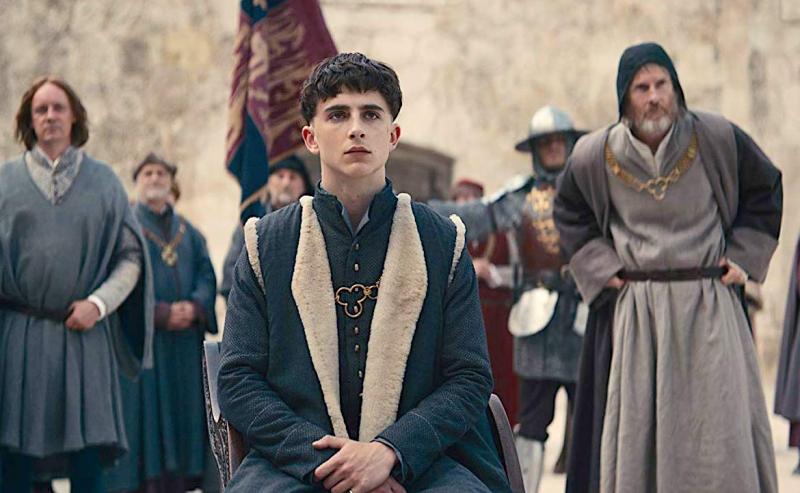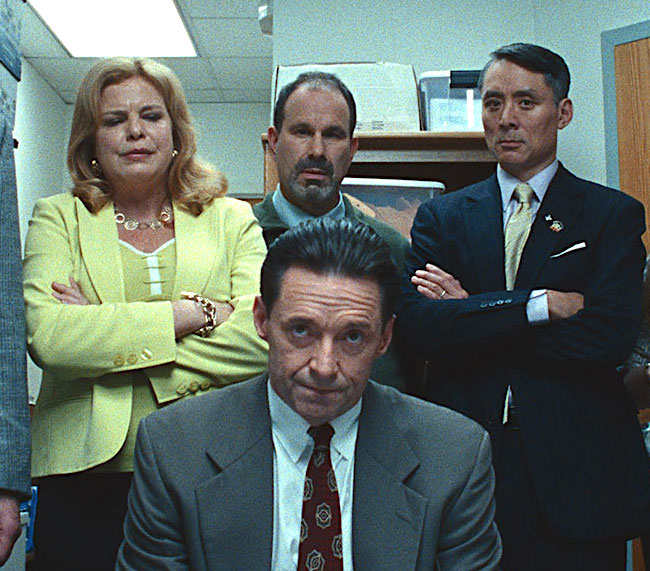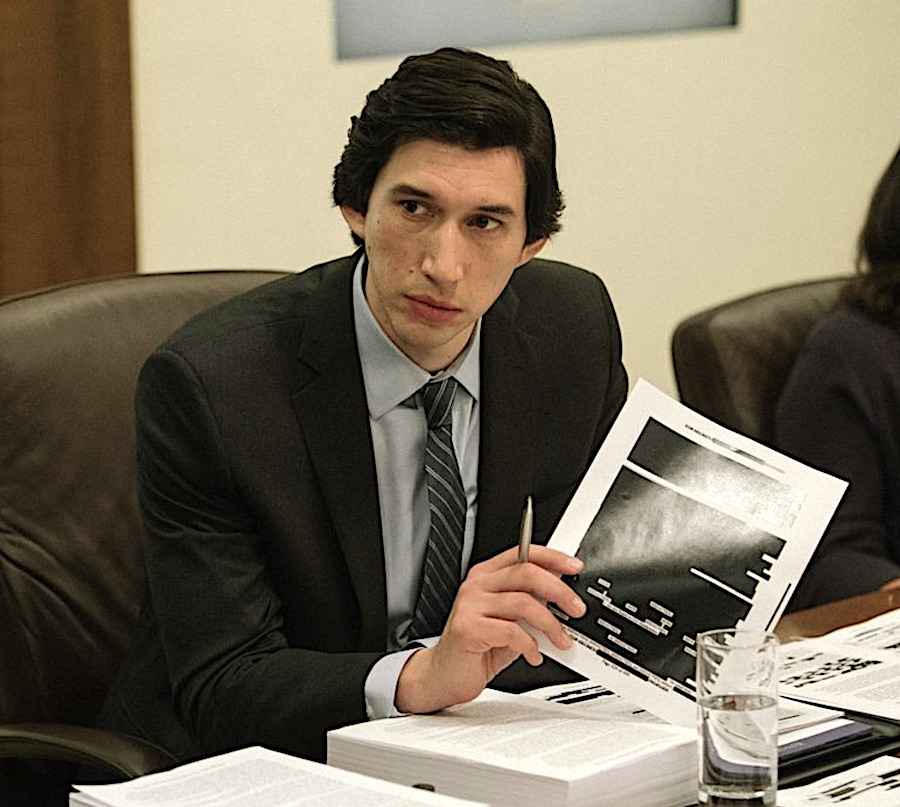LFF 2019: The King review - head conquers heart in Shakespeare adaptation | reviews, news & interviews
LFF 2019: The King review - head conquers heart in Shakespeare adaptation
LFF 2019: The King review - head conquers heart in Shakespeare adaptation
Joel Edgerton rewrites the Henriad, plus first looks at 'Bad Education' and 'The Report'

A labour of love for its co-writer, producer and star Joel Edgerton, The King (showing at London Film Festival) is derived from Shakespeare’s Henry IV and Henry V plays, but isn’t slavishly bound to them.
The screenplay, by Edgerton and director David Michôd, is determined not to be Shakespearean, though contrives to smuggle in some antique-sounding heft while not being altogether reliable in tone (having Sean Harris’s character William talking of “regime change” strikes a jarring bum note, as if somebody just knocked over a cupboard full of saucepans). However, it succeeds in converting the Bard’s fabled Henriad into a powerfully cinematic experience liberated from any vestiges of staginess, and finds room for some strong performances, not least Robert Pattinson’s hilariously bitchy Dauphin.
A bit more of such impertinence would have been welcome. A bulked-up Edgerton has dialled down Falstaff’s ribaldness and debauchery while adding practical wisdom, urging the dissolute Prince Hal to acknowledge his duty to his royal parent Henry IV, and later even becoming his battlefield tactician. Ben Mendelsohn’s old Henry sports a suspiciously manufactured English accent, but conveys the disillusion of a man whose kingdom is wracked by internal conflict and has seen his elder son apparently lost to him.
As the young king’s adviser and political tactician, Harris seizes the moment with a portrayal layered with subtle intonations. Indeed, it’s not until the closing minutes that a smart turnaround in the narrative brilliantly illuminates the filigree quality of Harris’s work. More problematic is Timothée Chalamet’s Henry V, who initially seems far too wan and pretty for the job, more like a fledgling Hollywood starlet debauching himself on Sunset Strip than a young man grappling with a crushing dynastic burden. His eventual acceptance of a cynical kind of realpolitik won’t send punters dancing ecstatically out of the multiplexes.
But battle scene connoisseurs won’t be disappointed. Henry’s invading army is rendered in splendid armour-glinting, horse-liveried detail. The siege of Harfleur features some breathtaking action from giant bomb-throwing catapults, while Agincourt is a crushing, grinding mud-bath of hacked bodies and stricken horses, like Chimes at Midnight meets Game of Thrones. It’s an intelligent take on Shakespeare, but more from the head than the heart.
 Bad Education
Bad Education
Having finally thrown off the lucrative but limiting Wolverine, Hugh Jackman (pictured right) is displaying the all-round skills of an actor of real stature. He was excellent as presidential candidate Gary Hart in The Front Runner, and he shows us a few more new moves here as Frank Tassone, the superintendent of Roslyn High School in Long Island, New York. Bad Education is the improbable true story of how Tassone, a popular educator feted for raising school standards and thereby boosting the prestige (and property values) of the local community, was arrested in 2004 after it was discovered he’d been embezzling millions of dollars of the school’s money.
Jackman’s twinkly charm works wonders as we see Tassone soothing indignant parents, always finding time for an encouraging word with his students (he punctiliously remembers the grades and subsequent careers of their older siblings too), and chairing meetings with smooth command. With hindsight though, he may have regretted encouraging the fledgling reporter from the school newspaper to always dig deeper and never take no for an answer.
Tassone’s facade of probity and rectitude is so impeccably realised that the subsequent revelations are genuinely shocking, and as the flabbergasting extent of his secret life emerges (including, but not limited to, treating himself to flights on Concorde) so Jackman shifts his character subtly towards his darker side. There’s excellent backup from Allison Janney as Tassone’s deputy Pam Gluckin, seemingly the diligent powerhouse in the school administration but with secrets of her own. Screenwriter Mike Makowsky was a Roslyn student when the scandal broke. He insists that despite everything, he got a great education.
★★★★
 The Report
The Report
Real-life investigations of covert scandals have become a resilient Hollywood genre, and here writer/director Scott Z. Burns takes as his text the US Senate Intelligence Committee’s investigation into the CIA’s torture of prisoners during the “War on Terror”, or what the Agency preferred to call “enhanced interrogation”. Adam Driver (pictured left) plays Daniel Jones, the solitary, single-minded Senate staffer designated to head the investigation by his boss, Senator Dianne Feinstein (Annette Bening, supporting Jones while tiptoeing carefully through Washington’s political minefield). The CIA’s determination to hide (or destroy) the damning evidence and keep the committee at bay meant that the task went on for years, but in the end there was nowhere to hide. Driver and Bening excel in the lead roles, but while Burns’s deliberately dry and analytical account of the affair lends some semi-documentary weight, the two-hour running time begins to drag. Scenes tend to take place in offices or the investigation’s claustrophobic basement room, and the fact that most viewers will already know the ending doesn’t help. However, scenes depicting waterboarding, sensory deprivation and mock burials are apt to shake the viewer out of complacency, while the two US Air Force psychologists (James Mitchell and Bruce Jessen) who sold their Enhanced Interrogation Techniques to the CIA are depicted as cynical charlatans. Their efforts, as recounted here, produced no usable intelligence whatsoever. Presidents and spooks alike emerge with their credibility, not to mention their morality, in tatters.
★★★
The future of Arts Journalism
You can stop theartsdesk.com closing!
We urgently need financing to survive. Our fundraising drive has thus far raised £49,000 but we need to reach £100,000 or we will be forced to close. Please contribute here: https://gofund.me/c3f6033d
And if you can forward this information to anyone who might assist, we’d be grateful.

Subscribe to theartsdesk.com
Thank you for continuing to read our work on theartsdesk.com. For unlimited access to every article in its entirety, including our archive of more than 15,000 pieces, we're asking for £5 per month or £40 per year. We feel it's a very good deal, and hope you do too.
To take a subscription now simply click here.
And if you're looking for that extra gift for a friend or family member, why not treat them to a theartsdesk.com gift subscription?
more Film
 Blu-ray: The Sons of Great Bear
DEFA's first 'Red Western': a revisionist take on colonial expansion
Blu-ray: The Sons of Great Bear
DEFA's first 'Red Western': a revisionist take on colonial expansion
 Spinal Tap II: The End Continues review - comedy rock band fails to revive past glories
Belated satirical sequel runs out of gas
Spinal Tap II: The End Continues review - comedy rock band fails to revive past glories
Belated satirical sequel runs out of gas
 Downton Abbey: The Grand Finale review - an attemptedly elegiac final chapter haunted by its past
Noel Coward is a welcome visitor to the insular world of the hit series
Downton Abbey: The Grand Finale review - an attemptedly elegiac final chapter haunted by its past
Noel Coward is a welcome visitor to the insular world of the hit series
 Islands review - sunshine noir serves an ace
Sam Riley is the holiday resort tennis pro in over his head
Islands review - sunshine noir serves an ace
Sam Riley is the holiday resort tennis pro in over his head
 theartsdesk Q&A: actor Sam Riley on playing a washed-up loner in the thriller 'Islands'
The actor discusses his love of self-destructive characters and the problem with fame
theartsdesk Q&A: actor Sam Riley on playing a washed-up loner in the thriller 'Islands'
The actor discusses his love of self-destructive characters and the problem with fame
 Honey Don’t! review - film noir in the bright sun
A Coen brother with a blood-simple gumshoe caper
Honey Don’t! review - film noir in the bright sun
A Coen brother with a blood-simple gumshoe caper
 The Courageous review - Ophélia Kolb excels as a single mother on the edge
Jasmin Gordon's directorial debut features strong performances but leaves too much unexplained
The Courageous review - Ophélia Kolb excels as a single mother on the edge
Jasmin Gordon's directorial debut features strong performances but leaves too much unexplained
 Blu-ray: The Graduate
Post #MeToo, can Mike Nichols' second feature still lay claim to Classic Film status?
Blu-ray: The Graduate
Post #MeToo, can Mike Nichols' second feature still lay claim to Classic Film status?
 Little Trouble Girls review - masterful debut breathes new life into a girl's sexual awakening
Urska Dukic's study of a confused Catholic teenager is exquisitely realised
Little Trouble Girls review - masterful debut breathes new life into a girl's sexual awakening
Urska Dukic's study of a confused Catholic teenager is exquisitely realised
 Young Mothers review - the Dardennes explore teenage motherhood in compelling drama
Life after birth: five young mothers in Liège struggle to provide for their babies
Young Mothers review - the Dardennes explore teenage motherhood in compelling drama
Life after birth: five young mothers in Liège struggle to provide for their babies
 Blu-ray: Finis Terrae
Bleak but compelling semi-documentary, filmed on location in Brittany
Blu-ray: Finis Terrae
Bleak but compelling semi-documentary, filmed on location in Brittany
 Oslo Stories Trilogy: Sex review - sexual identity slips, hurts and heals
A quietly visionary series concludes with two chimney sweeps' awkward sexual liberation
Oslo Stories Trilogy: Sex review - sexual identity slips, hurts and heals
A quietly visionary series concludes with two chimney sweeps' awkward sexual liberation

Add comment